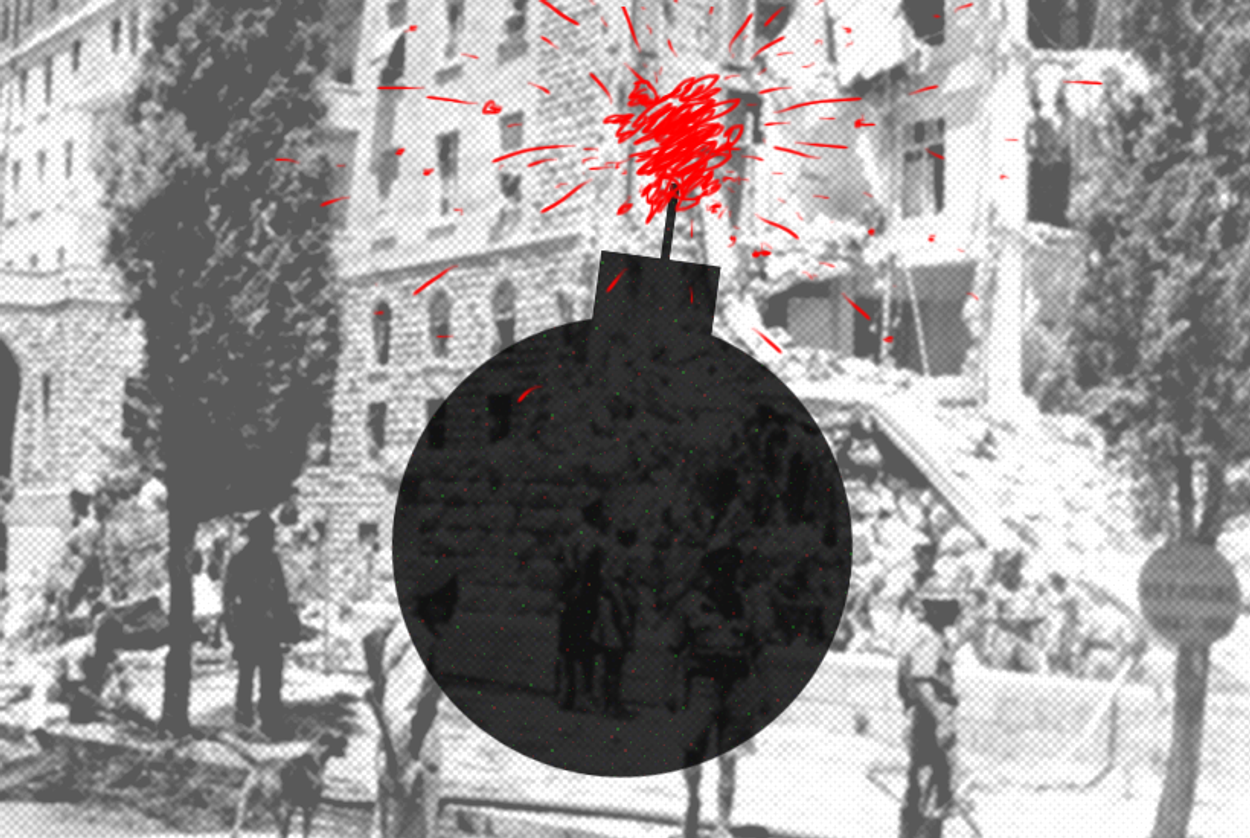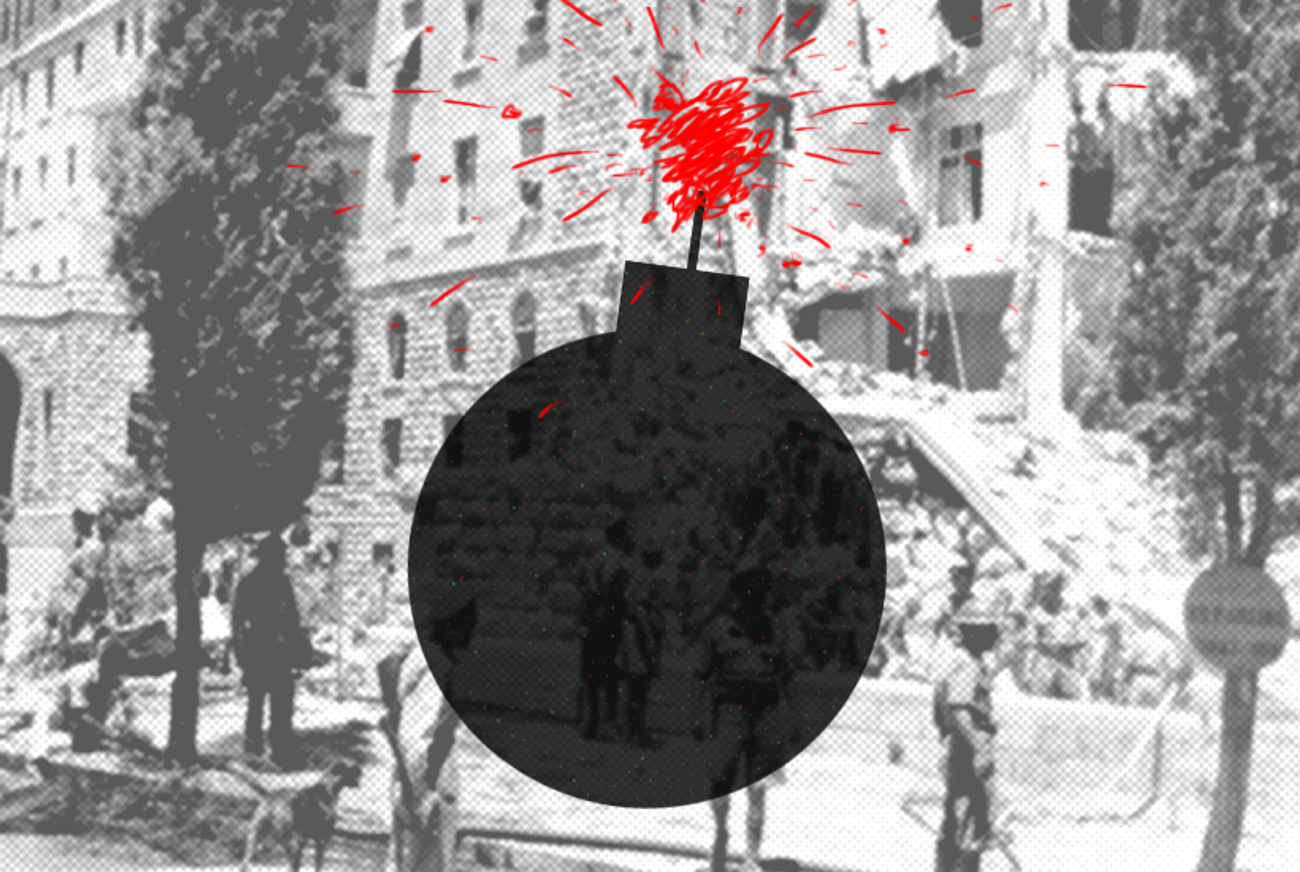Israel: The Original Terrorist State
Bruce Hoffman’s riveting new history of pre-1947 Palestine reviews the violent birth of the modern Jewish homeland




Today, the phrase “Palestinian terrorism” immediately conjures up Arab violence against Jews—suicide bombings in buses or restaurants, Hamas rockets launched from the Gaza Strip. Seventy years ago, however, a reader who encountered those words in a headline would have thought of terrorism not against Jews but by them. From 1944 until 1947, Palestine witnessed a series of assassinations, abductions, and bombings, perpetrated by Jewish terrorists against the occupying British. During that period, some 140 British soldiers and policemen were killed, along with dozens of civilian bystanders. In the end, the terrorists got what they wanted, when Britain announced its intention to withdraw all its forces from Palestine and leave the fate of the country up to the fledgling United Nations.
“Does terrorism work?” asks Bruce Hoffman on the first page of Anonymous Soldiers: The Struggle for Israel, 1917-1947, his riveting and deeply researched new history; and the answer, in this case, would seem to be yes. Of course, there were many factors leading to the creation of the State of Israel in 1948. The British Empire was on the decline everywhere, as the crushing economic toll of World War II forced Britain to curtail its overseas commitments. The Holocaust had created sympathy for the Zionist cause, above all in the United States, which kept up a continual pressure on Britain to admit Jewish refugees to Palestine. Most important of all, perhaps, the Jews of the Yishuv—the prestate settlement in Palestine—had created the infrastructure for a state, complete with an illegal but tacitly tolerated army, the Haganah.
Still, it is possible that none of these factors would have succeeded in winning Israel’s independence, if the Jewish campaign of terror hadn’t raised the cost of the British occupation so high. In writing Anonymous Soldiers, Hoffman made use of the previously classified archives of MI5, the British intelligence agency, and the book mostly tells the story of Palestine from the British point of view. As we read the memoranda and committee reports, the urgent telegrams from Jerusalem to London and the orders and reprimands that flowed back in return, we see something remarkable: the inner workings of a world power as it is utterly defeated by a few thousand determined militants.
Those militants belonged to two clandestine organizations, whose complex genealogy Hoffman explains in detail. Their story begins in 1929, when a series of Arab pogroms against Jews broke out across Palestine; altogether, 133 Jews were killed and more than 300 injured. These attacks made clear that the Yishuv needed an organized self-defense force, which it found in the Haganah (the Hebrew word means “defense”), an amateur volunteer group that was now put on official footing and greatly expanded. It was placed under the control of the Histadrut, the Jewish labor federation, which was the leading political institution in Jewish Palestine.
Within two years, however, a group of soldiers associated with the Revisionist Party—the more nationalistic and right-wing alternative to Labor Zionism led by Vladimir Jabotinsky—split from the Haganah over ideological and tactical differences. They became known as Haganah Bet, and “unlike the Haganah,” Hoffman writes, “the Haganah Bet did not see itself as a self-defense force.” Instead, it trained its recruits in offensive operations “including sabotage, bomb making, and hit-and-run attack—in other words, the core tactics of terrorism.” In 1937, after a new round of Arab attacks broke out across the country, much of the Haganah Bet returned to the original Haganah, whose policy insisted on havlaga or self-restraint.
But a hard core of radical officers refused to submit to the Haganah’s discipline. Instead, they announced the formation of a new armed group, the Irgun Zvai Le’umi (National Military Organization), which became known by its Hebrew acronym Etzel, or more commonly simply as the Irgun. (The title of Hoffman’s book comes from the Irgun’s hymn, which begins, “We are the anonymous soldiers without uniform/Surrounded by fear and the shadow of death.”) In the late 1930s, this group directed its attacks primarily against Arabs, planting bombs in Arab cafés and markets and killing dozens of innocent women and children.
Once Britain entered World War II, fighting against the Jews’ greatest enemy of all, Nazi Germany, the Irgun announced a suspension of hostilities. This gesture, however, was bitterly opposed by a small fraction of its leadership, including Avraham Stern, who had spent months in a British prison. Upon release, he left the Irgun to found his own groupuscule, which became known as the Stern Gang. After Stern himself was killed by the British in 1942, it took the name Lohamei Herut Yisrael (Fighters for the Freedom of Israel), and was known by its acronym, Lehi. If the Haganah’s membership numbered in the tens of thousands, and the Irgun’s in the low thousands, Lehi claimed at most 250 or so followers.
Yet these were committed terrorists, inspired by the idealistic assassins of Tsarist Russia, and they managed to pull off one of the most spectacular outrages of the whole period: the murder of Lord Moyne, the highest British official in the Middle East, in 1944. (That operation was plotted by the future Prime Minister Yitzhak Shamir.) By that time, the Irgun, too, had resumed its armed struggle against Britain, believing that once the defeat of the Nazis looked certain, it was time to begin pressuring the British on the future of Palestine. The Irgun was revitalized by the arrival in Palestine, in 1943, of Menachem Begin, a veteran activist and survivor of Soviet prisons (and another future prime minister), who commenced an audacious new campaign of attacks. The bloodiest of these was the bombing of the King David Hotel, in July 1946, which killed 91 people.
None of this history is new, but Hoffman excels at describing the complex internal politics of the terrorists, the Yishuv, and the British administration, which were constantly evolving. The mainstream Yishuv, which controlled the Haganah, regularly denounced the outrages of the Irgun and Lehi. But since the British had deeply alienated the Jews of Palestine by restricting Jewish immigration and deferring to Arab hostility, the Yishuv was not especially eager to cooperate with the British in actually cracking down on the terrorists. Indeed, for a brief period after the war, the Haganah and the Irgun actually joined forces.
The inability of the British to stop the terrorists, meanwhile, had officials in London and Jerusalem tearing their hair with frustration. They were caught in the familiar dilemma of the occupier: The more they cracked down on terrorism, the more the civilian population rallied to the terrorists’ side. The Irgun, never large or very popular, could nevertheless operate with impunity, and it answered every British escalation with a new response. When the British started flogging captured prisoners, Irgunists kidnapped some British soldiers and whipped them; when the British executed Jewish terrorists, Irgunists assassinated British policemen. As Hoffman shows in extensive detail, the British were never able to commit enough troops or police to Palestine to control it effectively. Instead, the occupying administration was forced to retreat behind heavily guarded camps, which the Jews mockingly referred to as Bevingrads, after the hated British Foreign Minister Ernest Bevin.
What it came down to, in the end, is what terrorism always comes down to: the assertion of will. The relentless terrorist campaign convinced the British press and public that the Jews’ will to create a state in Palestine was greater than Britain’s will to keep ruling it. Indeed, by 1947, the British must have wished that they had never conquered the country from the Turks in the first place, or inserted themselves into the Arab-Jewish conflict with the Balfour Declaration. Ironically, as Hoffman argues, what made the Irgun’s campaign of terror possible was British restraint and moderation. Despite all the provocations, the British never responded to terrorism with mass punishments or reprisals in kind. A different kind of occupier, one not averse to the spilling of Jewish blood, could have pacified the country quickly, if it chose to.
Anonymous Soldiers does a wonderful job of elucidating this enormously complex and important period in Jewish history. Hoffman does not attempt to answer all the moral and political questions his story raises, but no reader can avoid asking them. Was the terrorism of the Irgun and Lehi morally justified, since in the end it did help to win a Jewish state? If so, what are the implications of that judgment for today’s Palestinian terrorism, which is also conceived as an armed struggle against an occupying power, and which uses many of the same techniques pioneered by Begin? (Indeed, Hoffman ends his book by noting that a copy of Begin’s memoir The Revolt was discovered in the library of an al-Qaida training camp in Afghanistan.)
Hoffman’s story offers two possible morals, which point in opposite directions. One is that a determined national liberation movement will always triumph in the end, since the occupier’s will to remain is always going to be weaker than the occupied’s will to freedom. If this is true, then presumably the establishment of a Palestinian state in the West Bank and Gaza is only a matter of time, and every day that Israel resists such an outcome means more lives pointlessly lost.
The other moral, however, is that Israel only exists because of the ability of Jews to defend themselves with force. The British could be driven out of Palestine because they had a home to go back to; but the Israelis have nowhere else to go, and so they can never give up fighting. If this is true, then the struggle which began in the 1920s is destined to go on until the Jews convince the Arabs that they are in Israel to stay. (This was the view Jabotinsky advanced in his famous essay “The Iron Wall,” more than 90 years ago.) Whichever you believe, it’s clear that the future of the Jewish state depends on the correct interpretation of the story Hoffman tells in Anonymous Soldiers.
Adam Kirsch is a poet and literary critic, whose books include The People and the Books: 18 Classics of Jewish Literature.